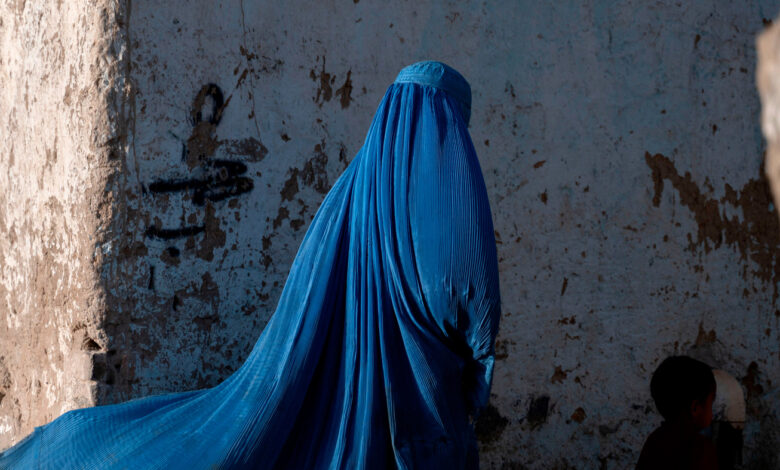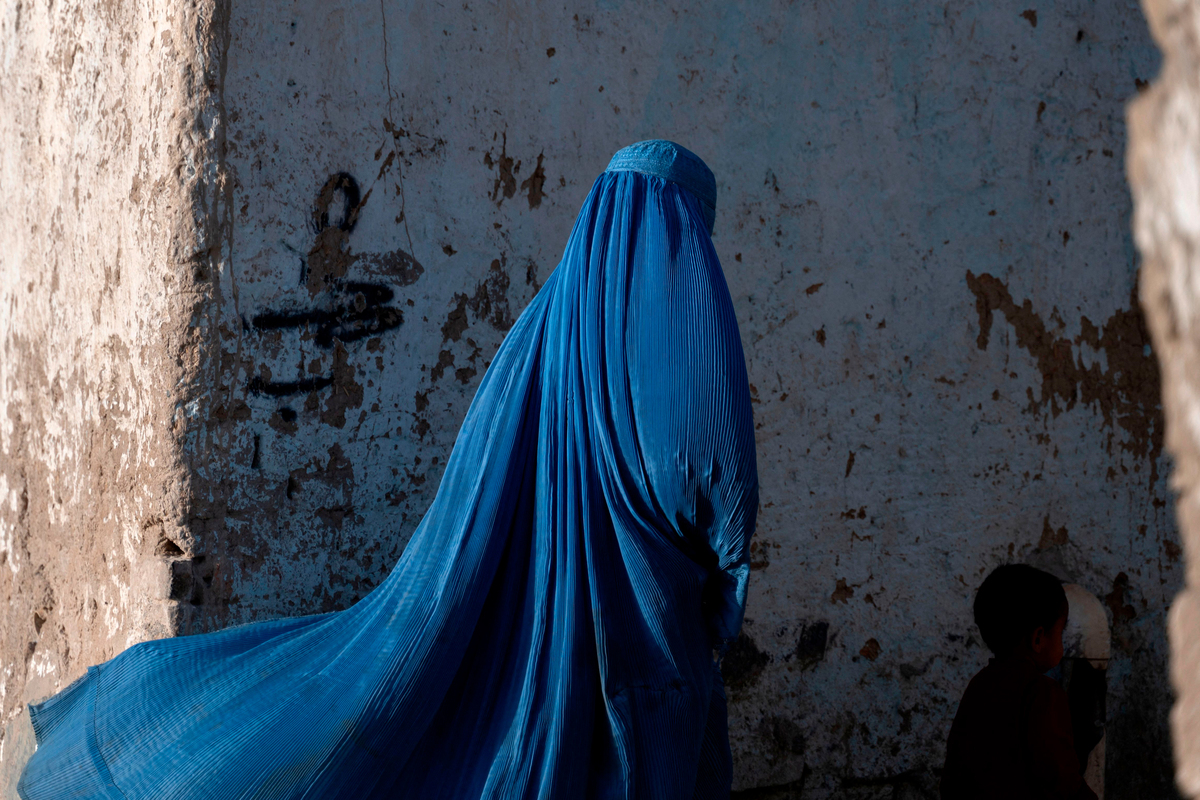report from Amnesty International: Goats and Soda: NPR


An Afghan woman walks with a child in Kabul, Afghanistan, April 28, 2022. A newly released report from Amnesty International, “Death in Slow Motion,” focuses on a range of issues affecting girls and women. Chief among them is child marriage and forced marriage.
WAKIL KOHSAR / Wakil Kohsar / AFP via Getty Images
hide captions
switch captions
WAKIL KOHSAR / Wakil Kohsar / AFP via Getty Images

An Afghan woman walks with a child in Kabul, Afghanistan, April 28, 2022. A newly released report from Amnesty International, “Death in Slow Motion,” focuses on a range of issues affecting girls and women. Chief among them is child marriage and forced marriage.
WAKIL KOHSAR / Wakil Kohsar / AFP via Getty Images
Early on Monday morning, just before dawn, a 23-year-old Afghan female journalist packed her things, said a gentle goodbye to her family, and left home in a carefully mapped plan. and is done with caution.
“My heart beat very fast throughout the journey, until I reached safety. I was escaping the brutality of the Taliban and I was afraid they would arrest me,” she said. The journalist asked to be identified only by her initials – FJ – because her family is still under Taliban surveillance inside Afghanistan.
She is evading threats of a forced marriage to a local Taliban fighter in her district in northern Afghanistan and moving to another country. “One of their commanders, who is only called ‘maulavi‘ [a title given to a religious leader] demanded that my parents marry me to him. They want to control and punish me for my work against them,” FJ said, referring to her reported criticism of the Taliban’s treatment of women and minorities.
“When I refused, they were offended and at first threatened to kill my parents, but then they threatened to kidnap me,” she told NPR, speaking from where she was hiding.
FJ says she knows girls in her community, including one of her neighbors, who have been kidnapped and forced into marriage with Taliban fighters over the past year.
Report: Women trapped in a web of restrictions
A new report released Tuesday by Amnesty International, titled “Death in slow motion: Women and girls under the Taliban“corroborates her claims, saying that ‘the rate of children, early and forced marriage in Afghanistan appears to have increased’ under Taliban rule.
The report, which includes interviews with 90 Afghan women and 11 girls in 20 of Afghanistan’s 34 provinces, details “a web of interrelated restrictions and prohibitions” that keep many Afghan women at bay. trapped, with no authority over their work, their education, their freedom to move, their clothes – and their marriage options.
The report also addresses a range of issues affecting Afghan women living under the Taliban, including restrictions on education, employment, clothing and even travel. The report also draws attention to the lack of legal avenues for women to address gender-based violence and protect their rights following the breakdown of existing institutional systems and safeguards. since the Taliban took over.
“Our report documents that in less than a year, the rights of women and girls have increased,” said Nicolette Waldman, researcher at Amnesty International and one of the report’s authors. destroyed by the Taliban”.
Waldman said that report was “difficult to study.”
“What really went through during the research was how all these restrictions on women and girls are linked together. I started documenting a case of forced marriage and then realized that I was also documenting violations of my right to work or to move, or she added that the Taliban’s restrictions were like a “spider web, trapping and enticing women and girls”.
Child marriage and forced marriage
The number of children and forced marriages are an important part of the newly released document.
Rates were exceptionally high in the country even before the Taliban took over, with nearly 28% of Afghan women and girls between the ages of 15 and 49 were married before the age of 18according to UNICEF.
While there is no nationwide assessment to identify trends in early and forced marriage, the report says there are several indicators of increased rates, including research from human rights and human rights organizations. rights such as UNICEF and the Danish Refugee Council. “During its research, Amnesty International received several other reports from advocacy groups and local activists that rates of early and forced child marriage had increased. boom in their regions, whether rural or urban,” the report states.
Often, these marriages were the result of economic and humanitarian crises and widespread famine, forcing many families to give in to younger daughters in exchange for a “bride price” that could help sustain them. .
“In Afghanistan, it’s a perfect storm for child marriage. You have a patriarchal government, war, poverty, drought, girls dropping out of school – all of these factors combined. .. we know that child marriage will come to an end,” said Stephanie Sinclair, director at Too young to do wednesdayan organization that works to prevent forced marriages and children, told Amnesty International.
The report records two cases of forced marriage to Taliban fighters and commanders and receives credible reports of several others.
“What we read in these reports is only a small fraction of the atrocities that the Taliban are committing against women in Afghanistan, who are living their darkest hours,” said Huda Khamosh. , an activist living in exile in Afghanistan who was arrested by the Taliban for protesting, earlier this year, told NPR. “It is very difficult to conduct thorough investigations under the Taliban, we hear of many cases of women committing suicide to escape the brutality of the Taliban,” she said, referring to the newspapers. women’s reporting in the Afghan media.
The Amnesty report also interviewed family members of the girls and women, who said the Taliban used their position of influence and power to force marriage – despite the decree. of the Taliban bans forced marriage. A decree issued by Taliban leader Hibatullah Akhunzada in December 2021 states: “Men and women are equal and no one can force a woman to marry by force or pressure.”
Former humanitarian worker Mohammad Farooq shared a story he knew from his community. “About eight months ago, the governor of the Taliban district, who must be almost 45 years old, married one of the young girls from the 17-year-old district. She was against this marriage, but the Taliban are very strong and have full They also paid her father a million Afghans.” Farooq demanded that his location be kept private because revealing his location would put him at risk.
Farooq added that he is aware of 10 such forced marriages in his district alone in the past year.
Don’t blame the bride’s family
However, he refused to judge the families harshly. “The kind of pressure they face from the Taliban is unthinkable. The Taliban not only have power, but they don’t resist the use of force if they need to. Families don’t have the choice to refuse.” he explained and added that there is no longer a mechanism to complain. “Religious scholars, judges and village elders who may have intervened in the past are also afraid of the Taliban. So who can approach a woman forced into marriage?”
FJ, the journalist who ran away from her home, agrees with his point. “Surname [the Taliban fighters forcing girls to marry] get support from leaders because they are very confident in doing this [threats and kidnapping].
“Now I’m lucky to escape to a neighboring country, but my life is in limbo because I could be deported at any time. But here are a lot of women I know who had to. marry the Taliban because it’s not easy to leave if you’re that kind of person.” a woman,” she said.
Call for change, worry about the future
Waldman called on the Taliban to “urgently change course” and asked the international community to intervene. “The international community should develop and implement a coordinated strategy to pressure the Taliban to do this – and they must send a clear message to the Taliban that their discriminatory policies against women and girls will never be accepted They should impose consequences on the Taliban for their conduct, including targeted sanctions or travel bans imposed through the Resolution of The UN Security Council can influence the Taliban without harming the Afghan people,” she recommended.
Meanwhile, FJ remains deeply concerned for the safety of her family, who are still under the surveillance of the Taliban. “They know I’ve left and they’re harassing and embarrassing my family because of it. I’m so scared they’ll hurt my parents or kill them for supporting my freedom,” she choked out. sweetly added.
“I’m in a very bad state of mind; I used to be the voice of Afghan women, and overnight, I became voiceless, powerless and nobody fought and defended my rights. I wish no woman had to go through what I went through,” she added.
Ruchi Kumar is a journalist covering conflict, politics, development and culture in India and Afghanistan. She tweets at @RuchiKumar
Hikmat Noori is an Afghan journalist who writes about the intersection of culture and politics in South Asia. He tweets at @noori1st




